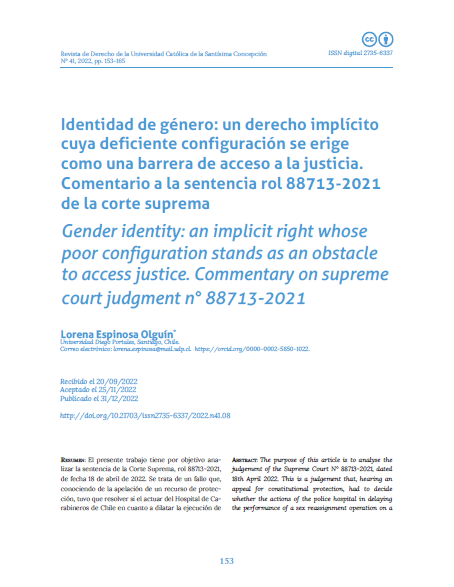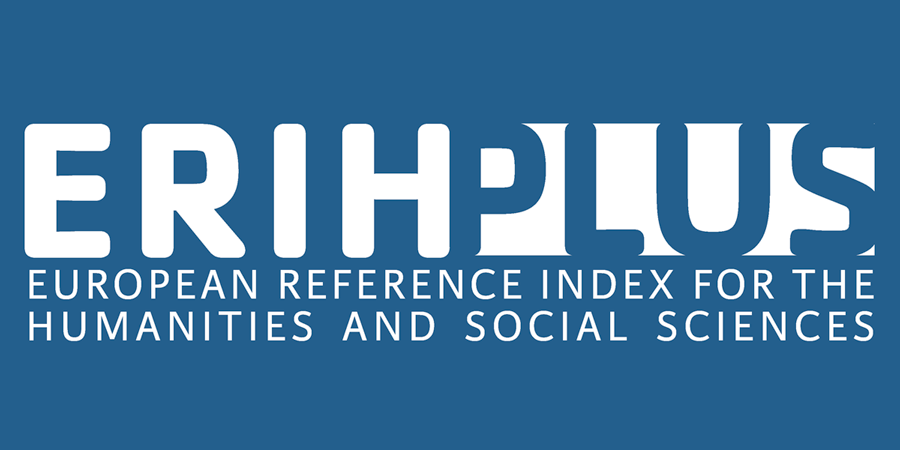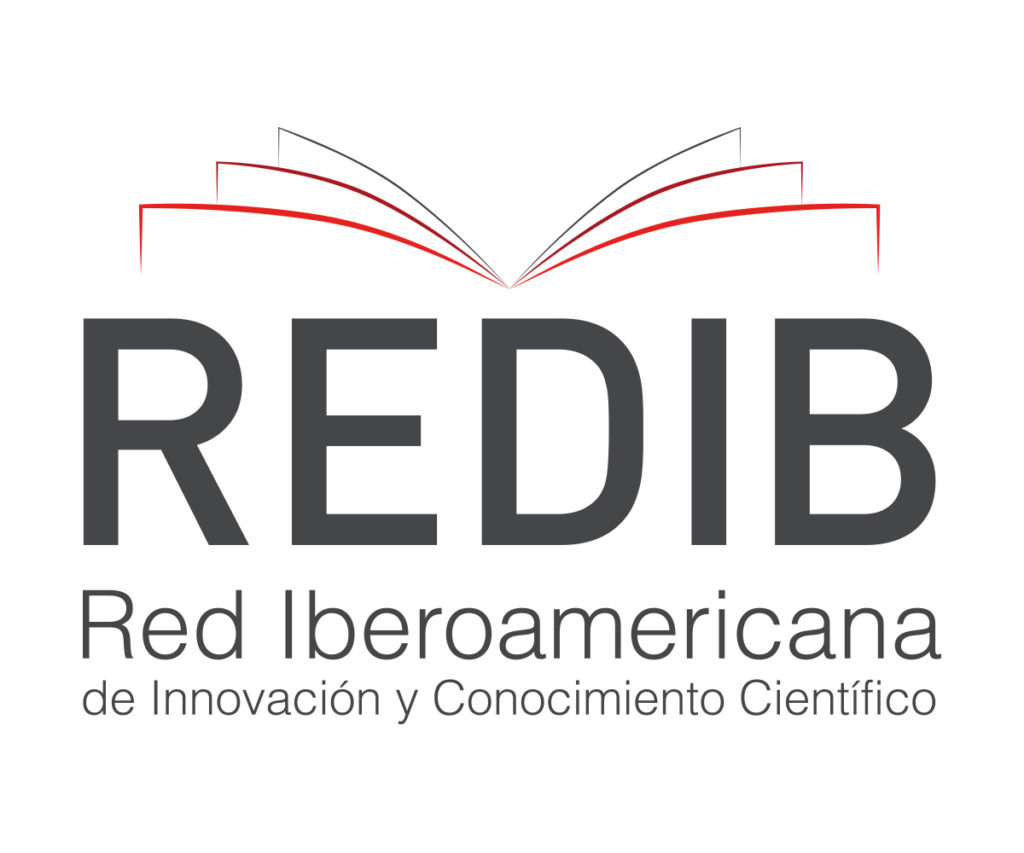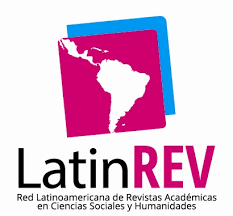Identidad de género: un derecho implícito cuya deficiente configuración se erige como una barrera de acceso a la justicia. Comentario a la sentencia rol 88713-2021 de la Corte Suprema
DOI:
https://doi.org/10.21703/issn2735-6337/2022.n41.08Palabras clave:
identidad de género, acceso a la justicia, barreras de acceso a la justiciaResumen
El presente trabajo tiene por objetivo analizar la sentencia de la Corte Suprema, rol 88713-2021, de fecha 18 de abril de 2022. Se trata de un fallo que, conociendo de la apelación de un recurso de protección, tuvo que resolver si el actuar del Hospital de Carabineros de Chile en cuanto a dilatar la ejecución de una operación de reasignación de sexo a una persona mayor de edad, calificaba como una acción arbitraria e ilegal. Se trata de una sentencia relevante no solo porque marca una nueva línea jurisprudencial al reconocer la existencia de un derecho implícito a la identidad de género, sino porque nos permite precisar el concepto de identidad de género y argumentar cómo, una inadecuada comprensión de ella, se erige como una barrera de acceso a la justicia.
Descargas
Referencias
ARRUBIA, EDUARDO J. (2019): “The Human Right to Gender Identity: From the International Human Rights Scenario to Latin American Domestic Legislation”, en: International Journal of Law, Policy and the Family (Vol. 33, Nº 3), pp. 360-379.
BEQIRAJ, Julinda y MCNAMARA, Lawrence (2014): International Access to Justice: Barriers and Solutions (Bingham Centre for the Rule of Law Report 02/2014), International Bar Association.
BIRGIN, Haydée y GHERARDI, Natalia (2018): “Introducción”, en: BIRGIN, Haydée y GHERARDI (coordinadoras), La garantía de acceso a la justicia: aportes empíricos y conceptuales, 2ª Edición (México, Suprema Corte de Justicia de la Nación).
BOCARDO, Alejandra, et al (2019): Conflictividad Civil y Barreras de Acceso a la Justicia. Informe de Relaciones de Pareja y Familias (Santiago, OCCA: Centro de Estudios de Justicia de las Américas).
BUTLER, Judith (2016): El género en disputa. El feminismo y la subversión de la identidad (Argentina, Paidós Studio).
CANNOOT, Peter (2019): “The pathologisation of trans* persons in the ECtHR’s case law on legal gender recognition”, en: Netherlands Quarterly of Human Rights (Vol. 37, Nº 1), pp. 14-35.
CENTRO JUSTICIA Y SOCIEDAD (CJS-UC) (2020): Necesidades jurídicas y cursos de acción del ciudadano ante las barreras de acceso a la Justicia. Informe final (Santiago, Corporación Administrativa del Poder Judicial)
COMISIÓN INTERAMERICANA DE DERECHOS HUMANOS (2015): Violencia contra personas lesbianas, gays, bisexuales, trans e intersex en América (Washington D.C., Organización de los Estados Americanos).
DUNNE, Peter (2017): “Legal gender recognition in Europe: sterilisation, diagnosis and medical examination requirements”, en: Journal of Social Welfare and Family Law (Vol. 39, Nº 4), pp. 1-4.
FRASER, Nancy (1997): Justice Interruptus: critical Reflections on the «Postsocialist» condition (New York, Routledge).
GAUCHÉ MARCHETTI, Ximena y LOVERA PARMO, Domingo (2019): “Identidad de género de niños, niñas y adolescentes: Una cuestión de derechos”, en: Revista Ius et Praxis (Año 25, Nº 2), pp. 359-402.
GAUCHÉ MARCHETTI, Ximena (2021): “Identidad de Género e Igualdad: Aportes desde la Necesidad de Reconocimiento a las Identidades Trans”, en: RAVETLLAT BALLESTÉ, Isaac y LEPIN MOLINA, Cristián (directores), Identidad de Género (Valencia, Tirant lo Blanch): pp. 175-213.
GUASTINI, Riccardo (2015): “Interpretación y Construcción Jurídica”, en: ISONOMÍA (Nº 43), pp. 11-48.
mAffíA, Diana (2015): “Barreras en el ejercicio de los derechos humanos” en: Boletín Nº 07, Observatorio de Género en la Justicia (Buenos Aires, Consejo de la Magistratura CABA), disponible en: https://consejo.jusbaires.gob.ar/acceso/genero/genero/44D00C70D8092AC1ACC9B72036FD499A (fecha de consulta: 17 de septiembre de 2022).
PLEASENCE, PASCOE, BALMER, Nigel J., y DENVIR, Catrina (2015): How People Understand and Interact with the Law (Cambridge, PPSR), disponible en: https://research.thelegaleducationfoundation.org/wp-content/uploads/2018/03/HPUIL_report.pdf (fecha de consulta: 17 de septiembre de 2022).
RADI, Blas (2017): “Acceso de las personas travestis y trans a la Justicia”, en: Boletín Nº 12, Observatorio de Género en la Justicia (Buenos Aires, Consejo de la Magistratura CABA), disponible en: https://consejo.jusbaires.gob.ar/acceso/genero/genero/9248DF3F083AB1BFC48ACEB1700A825B (fecha de consulta: 20 junio 2022).
RAVETLLAT BALLESTÉ, Isaac (2017): “El derecho a la identidad (de género) de la infancia y la adolescencia: del paradigma de la patología a la autodeterminación”, en: Actualidad Civil (Nº 9), pp. 42-62.
RAVETLLAT BALLESTÉ, Isaac (2018): “Igual de diferentes: la identidad de género de niñas, niños y adolescentes en Chile”, en: Revista Ius et Praxis (Año 24, Nº 1), pp. 397-436.
SCOTT, Joan (2015): “El género una categoría útil para el análisis histórico”, en: LAMAS, Marta (compiladora), El género. La construcción cultural de la diferencia sexual, 2ª edición (México, Bonilla Artigas Editores): pp. 251-290.
WINTER, Sam, et al. (2016): “Transgender people: health at the margins of society”, en: The Lancet (Vol. 388, Nº 10042), pp. 390-400.
YOUNG, IRIS M. (1990): Justice and The Politics of Difference, Reedición de Bolsillo 2011 (Princeton, Princeton University Press).
Normativa citada
Ley Nº 21.120, reconoce y da protección al derecho a la identidad de género, 10 de diciembre de 2018. Principios de Yogyakarta, sobre la aplicación de la legislación internacional de derechos humanos en relación con la orientación sexual y la identidad de género, 10 de noviembre de 2017.
Jurisprudencia citada
A.P., Garçon and Nicot v. France (2017): Tribunal Europeo de Derechos Humanos, de 6 abril de 2017, Applications 79885/12, 52471/13 and 52596/13.
corte idh, OC-24/17, Solicitada por la República de Costa Rica, Identidad de Género, e Igualdad y No Discriminación a Parejas del Mismo Sexo, de 24 de noviembre de 2017.
V.D. con Hospital de Carabineros de Chile (2022): Corte Suprema, de 18 de abril de 2022, Rol Nº 88713- 2021

Descargas
Publicado
Número
Sección
Licencia
Derechos de autor 2022 Revista de Derecho

Esta obra está bajo una licencia internacional Creative Commons Atribución 4.0.











